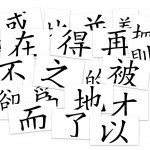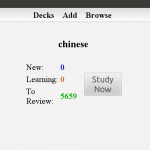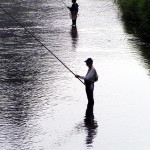Recent articles about how to learn Mandarin Page 38
-
Sensible Chinese character learning challenge 2014
The 2014 sensible Chinese character learning challenge starts soon! This article introduces the challenge and how you join us. Apart from learning a lot of characters and improving the way you learn characters, you also get a discount and free extensions on Skritter, as well as a chance of winning character posters from Hanzi WallChart!
Read → -
Sensible Chinese character learning revisited
In a way, learning Chinese characters is very much like learning vocabulary in any foreign language and much of the efficient methods developed there works well for Chinese as well. However, characters are also fundamentally different from words in English and this influences how we should learn them as well. This article is a recap of how to learn Chinese characters in a sensible way. It is also a prologue for the upcoming character learning challenge.
Read → -
Hacking Chinese meet-up in Taipei 2014-03-22
It’s been way too long since the previous meet-up and it’s time to get together again to talk about Chinese, life, the universe and whatever else you want to talk about. About a dozen people usually turn up and this is an excellent occasion to get to know some other serious learners and talk about Chinese for a few hours. The main language is English (i.e. you don’t have to be good at Chinese to join), but Chinese is of course also great.
Read → -
Asking the experts: How to learn Chinese grammar
How should we learn Chinese grammar? This article collects the best answers from more than 15 experts and experienced learners.
Read → -
Flashcard overflow: About card models and review directions
The question of how to design flashcards is faced by all learners who use them. What should you put on the front? What should you put on the back? Should you add single characters or whole words? Or perhaps sentences are better? The general answer is that it depends and this article discusses some of the factors the answers depend on.
Read → -
Learning how to fish: Or, why it’s essential to know how to learn
Learning how to learn Chinese is an essential skill for any student, regardless if you study on your own or in a course. This article explains why going to class is not enough.
Read → -
Two reasons why pronunciation matters more than you think
Good pronunciation matters, whether you like it or not. In general, students (and teachers) tend to stop caring about pronunciation much earlier than they should. You don’t need to aim for native-like pronunciation, but clear and easily-understood Chinese should be the goal of all students. In this article I present two arguments: one about the fact that pronunciation and communication are closely linked, one about how pronunciation reflects both you as a person and your other skills.
Read → -
Habit hacking for language learners
Forming language learning habits is a key ingredient in any successful recipe for mastering Chinese. This makes sure that we learn regularly and that it becomes a natural part of our lives, rather than something we do artificially only occasionally and perhaps a little bit reluctantly. This article deals with the basics of how to form habits and how they can be used to boost your language learning.
Read → -
Hacking Chinese 2013/2014: What was and what will be
2013 was a good year on Hacking Chinese, even though I didn’t publish any of the e-books I have in the pipeline. In 2013, another 56 articles were published, reaching more than twice as many readers as last year. This article details some of the most important developments in 2013, as well as my thoughts on the future of Hacking Chinese.
Read → -
Focusing on tone pairs to improve your Mandarin pronunciation
When learning to pronounce tones in Chinese, it makes sense to focus on words rather than single syllables. Most words in Mandarin are disyllabic and since practising these will also include tone changes (sandhi), focusing on tone pairs is recommended. This article gives you all HSK and TOCFL words, sorted by tone! First all [first tone] + [first tone], then all [first tone] + [second tone] and so on. This is great for students who need words to practise difficult combinations, but it’s also useful for teachers.
Read →





